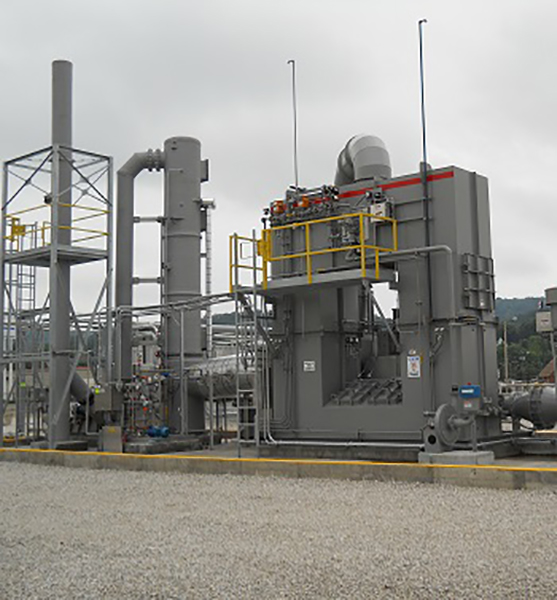Regenerative Thermal Oxidizers (RTOs)

Regenerative Thermal Oxidizers (RTOs)
Widely considered to be the most energy-efficient oxidizer, Anguil’s Regenerative Thermal Oxidizer (RTO) uses ceramic media to recover upwards of 97% of the available energy.
What makes our RTO so popular is its ability to repurpose the thermal energy generated during operation to reduce operating costs and energy consumption of the system itself. The regenerative component makes it capable of fuel-free operation at very low VOC concentrations.
WHAT SETS ANGUIL’S RTO APART?
Anguil’s first RTO was designed and manufactured in the early 1990’s. Since then, our design has undergone countless enhancements with operator input always at the forefront.
- Destruction efficiency (99+%) and thermal energy recovery efficiency (up to 97%), guaranteed compliance with industrial regulations
- Custom-designed poppet valves ensure minimal leakage and thus high destruction efficiency and optimized heat recovery
- Small equipment footprint
Benefits of Anguil’s RTOs
- System pressure drop resulting in reduced electrical consumption
- Multiple designs for easier and faster installation
- Greater system flexibility and versatility
- High reliability and long-life expectancy (15-20 years+)
DESIGN FEATURES AND OPTIONS FOR ANGUIL TECHNOLOGY
Features
- Pre-assembly, wiring, and testing as much as possible prior to shipment
- Can handle process flows up to 25% Lower Explosive Limits (LEL) with self-sustaining LELs as low as 3%
- The burner is sized for full flow, zero process VOC emissions so that the RTO can maintain temperature and VOC destruction efficiency over the entire range of process operation.
- Bake-out capabilities designed to remove organic particulate buildup
- Hinged access doors for ease of maintenance
- Variable Frequency Drives (VFDs) to support high volumetric turn-down during low-process and idle conditions
- Compliance with FM Global and other international certifications
Options
- Various burner options including electric heating elements or multiple gas fuel inputs (natural gas, propane, hydrogen) and ultra-low NOx
- Specialty designs for high-temperature, corrosive, or silicon-bearing compound conditions
- Two-chamber and multi-chamber configurations
- Hot Gas Bypass (HGB) for high VOC emission concentrations
- Induced or forced draft fan arrangements
- Supplemental Fuel Injection (SFI) with mixing vanes for fuel efficiency, low NOx operation, burner redundancy, and uniform temperature distribution
- Acid gas scrubber module with a completely integrated control system
- Secondary Heat and Energy Recovery systems for waste heat utilization
- Integrated process air pre-heating to minimize condensation and allow the use of less expensive materials of construction
HOW DOES THE RTO TECHNOLOGY WORK?
Regenerative thermal oxidizers are designed to destroy HAPs, VOCs, and odorous emissions discharged during industrial and manufacturing operations. They achieve emission destruction through high-temperature thermal oxidation—a process that employs a combination of temperature, residence time, turbulence, and oxygen to convert pollutants into carbon dioxide and water vapor.
Operations within RTOs occur as follows:
- System fan draws process emissions into the RTO
- The process stream is routed into the poppet flow control valves
- Poppet valves direct the untreated process emissions into the first chamber filled with ceramic energy recovery media
- High temperature and turbulence quickly break apart the contaminated compounds in the combustion chamber
- The purified stream exits via the second media bed, releasing up to 97% of its heat value
- Every few minutes, the poppet valves switch, and the flow reverses direction. The captured heat from the exiting purified stream preheats the incoming dirty process emissions.
- Cleaned, cool air is released to atmosphere via the exhaust stack